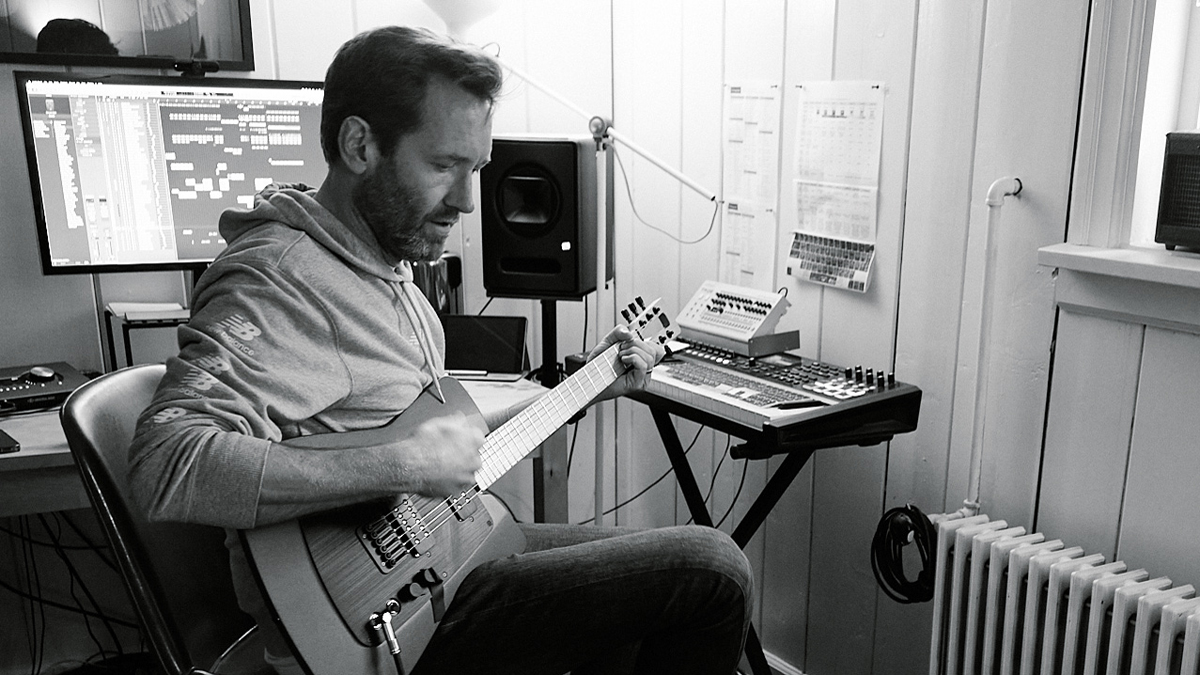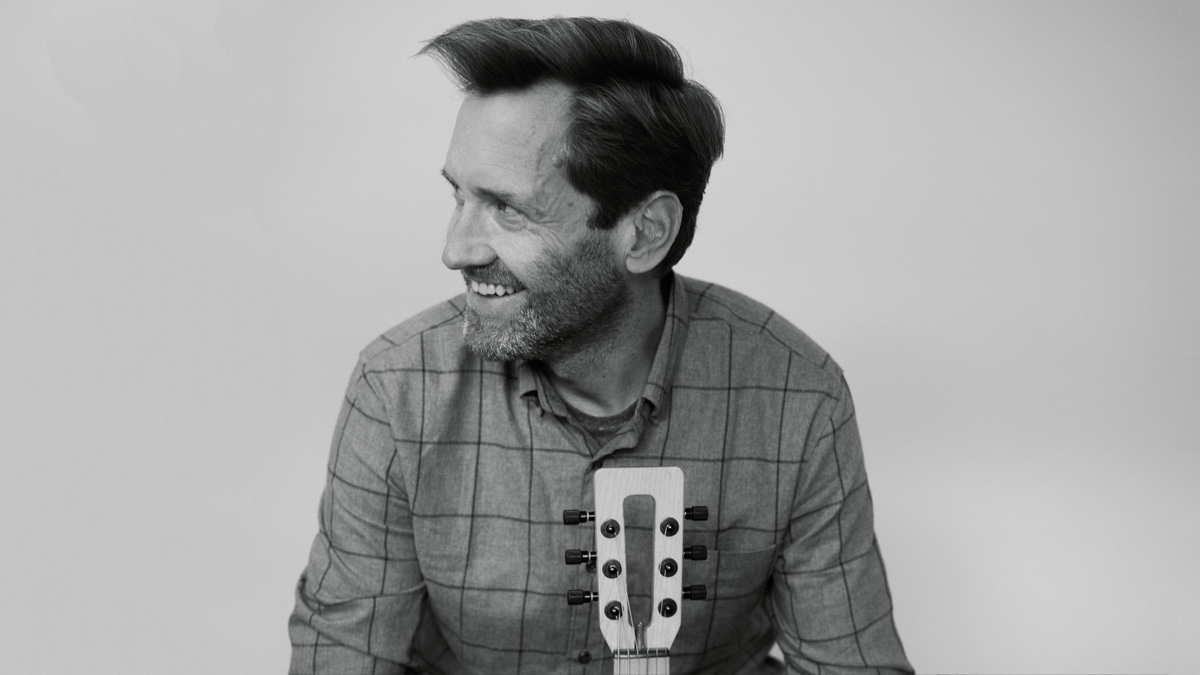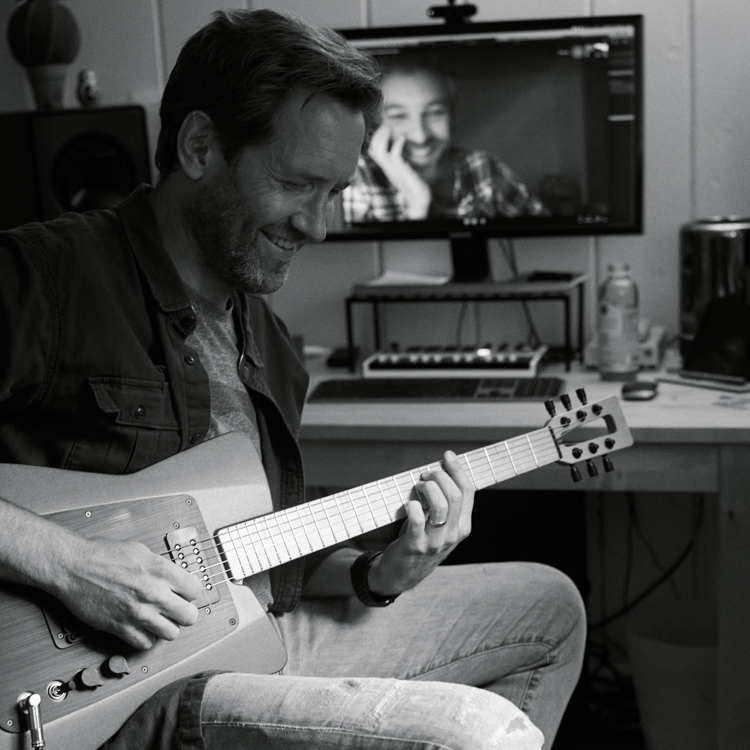David Knudson on how sobriety, home recording and an unending love of the Line 6 DL4 helped him create his first-ever solo album
The Minus the Bear effects wizard opens up on his evolving relationship with the riff, his newfound studio production abilities and why you shouldn't hold your breath for a Botch reunion

David Knudson’s debut solo album, The Only Thing You Have to Change Is Everything, arrives more than three years after the dissolution of his previous group, beloved Seattle indie-rockers Minus the Bear. The guitarist suggests, however, that the seeds of a solo career had been sown well before that, while he was working out extra-curricular riffs during soundchecks.
“I think the solo record has always been something that was on the table, [but] I’m kind of bad at doing multiple projects at once,” he explains. “There was a ton of material that I would bring to Minus the Bear that wasn’t suitable. For a long time, that was what I thought the solo record would be.”
The Only Thing You Have To Change Is Everything has been a work in progress since 2019, and naturally evolved over time. Initially, Knudson had teamed up with producer Sam Bell – who had worked on Minus the Bear’s 2016 swansong, VOIDS – to track a handful of instrumental tunes at Seattle’s Avast! Recording Co., but both musicians decided to pull out of the professional studio to work at a more relaxed pace.
Knudson built a home recording setup in his basement, and, with assistance from Bell, additionally upped his knowledge on amp simulators and beat programming.
“Through this whole process, I just got better at writing by myself and learning recording software,” Knudson reflects. “I feel like I’m fairly proficient at recording myself now. It’s not like I can record a full band, but if I have ideas, I can throw them down and make them sound pretty great. Learning that was the biggest benefit of this whole project, honestly.”
While Knudson’s riffing has long steered away from the fluid, tap-heavy indie of early Minus the Bear – not to mention the detuned discombobulation of his first band, cult hardcore outfit Botch – his effects-stuttered contortions on album opener Varv speak to his never-ending love for the Line 6 DL4. Elsewhere, The Sound of Love Returning and Medalle unfold as expansive constellations of delay-sculpted melody; Rewind It works a heretofore unexplored red velvet funk.
As time went on, though, Knudson realized his new tunes needed a human touch, leading the guitarist to reach out to singer friends like Bell, Bayonne [a.k.a. Roger Sellers], former Minus the Bear vocalist Jake Snider, and the Coathangers’ Julia Kugel to add vocals.
Get The Pick Newsletter
All the latest guitar news, interviews, lessons, reviews, deals and more, direct to your inbox!
“It’s always nice to have something that someone can hum along to – an earworm that gets stuck in their head. That’s harder to do with just a guitar riff,” Knudson says. “It’s certainly possible, and I try to do that all the time, but there’s a humanity that vocals add to [a song].
Speaking with Guitar World, Knudson dove into the making of his solo debut, his ongoing love affair with the Line 6 DL4, and why – despite an upcoming round of vinyl reissues – a Botch reunion is “not in the cards”.
Though the record features a number of guest vocalists, the album begins with an instrumental: Varv. It’s also a much riffier piece than the other songs. Why did this one stay instrumental?
“That one and Spaldo stood on their own as instrumental pieces. They went to the places I wanted them to go, with no vocal required.
“The reason Varv starts the album is because I wanted to kick the album off with a statement: this is my solo record; this is what goes on in my brain; this is what happens when I get in the studio. It felt like it encapsulated the project as a whole.”
There was a recent video of you testing out the new Line 6 DL4 MKII pedal. Did it make it onto the record, or were you working with the original?
“I got that after the fact. I’m sure you can tell, but there’s a ton of DL4 sampling on there – the double-time and reversed tricks. I love that pedal because it allows a guitarist to sound like they’re cutting up a song, like [electronic artists] Caribou or Four Tet – somebody that would cut up a track in a computer [to] make it stutter. I’ve always loved that sound. The DL4 is an amazing way to make that happen.
“The new pedal is great because it’s got a memory. If it becomes unplugged, the sample is still saved in there, which was always frustrating live. I wish we had those when Minus the Bear were touring. That would've been so helpful.”
What other effects were you gravitating towards while making this record?
“Sam is really into making guitars sound synth-y with a lot of fuzzes and octave effects, so there were a lot of pitch-shifter delays, like the Boss PS-3, and a lot of crazy fuzz pedals going into a Whammy pedal to get that super-smooth but synth-y tone. We used the Malekko B:assmaster a ton to drive the Whammy and get it sounding bizarre.
All the guitars were recorded using amp sims. I had no confidence in it sounding good [but] it’s incredible what’s possible in-the-box these days
“It’s funny, apart from the acoustics, none of the guitars, were mic’d. We did all this in-the-box. Sam was like, ‘We're just going to do it at your house. We don’t need to mic anything; we’ll just use amp sims like Logic or Neural [DSP].’
“At first, I had no confidence in it sounding good, [but] it’s incredible what’s possible in-the-box these days.”

Through your recent Instagram reels, you’ve been fooling around with a Millemetric MGS3. Was that a go-to guitar on these sessions?
“I think there were a couple of overdubs, but for the most part it was a lot of my PRS guitars. There’s actually a ton of my Fender Jaguar baritone, too, which sounds super.
“Before Sam moved to Seattle, he was in Athens studying to be a guitar luthier. He’d been fixing a ton of acoustics; all of the acoustic on the record is a super-old, beat-up Biltmore that he resurrected from some pawn shop for maybe 100 bucks. That thing is just beautiful. It fits in my hands so well, because the scale is a bit shorter.”
You come from a hardcore background. Texturally, your new song Rewind It sounds like it could’ve been on VOIDS, but there’s also a lot of funky, staccato accenting in there. Is there any funk in your background?
“I’ve certainly loved some of the early Funkadelic records, like Maggot Brain, and also Betty Davis and Parliament. They have some great [records], but they also have some truly horrendous missteps.
“That guitar part you’re talking about in Rewind It was a total Sam thing. I would never normally think to play something like that in the verse. Sam was like, 'Just try this, and if it’s bad we’ll just delete it.'
“A lot of times I’m all about riffs. Throughout Botch and Minus the Bear I wanted to write great songs, not just riff after riff, but Sam was able to guide me down the right path to finding things that elevated the song, rather than, ‘Just do this flashy thing that you’ve done before.’ Those go-to tricks work, but it’s great to have someone else around to say, ‘Yeah, you’ve done that before. Let’s try something new.’”
With that in mind, when I think of Minus the Bear – especially in the early days of [2002’s] Highly Refined Pirates – a big part of your style was melodically tapping through lines all over the fretboard. Is there any of that on here?
“There might be a few overdubs, but I don’t think there are any parts where tapping is the basis of the song like it was on Highly Refined Pirates. There were one or two [tapping] songs that almost made the record, but that stuff didn’t make it because I didn’t think it was good enough. There is a collection of eight or nine extra songs that will probably be reworked and used for something else.”
How does that idea of “rewind and start again,” as sung in the chorus of Rewind It, apply to the overall experience of making this record?
“It feels awesome to be able to release this stuff on my own without the need for a label. It’s like going back to the early days of Botch, before we had a label or anything. I’m kind of betting on myself with this.
I haven’t felt this level of creative passion in years. Rewind It speaks to that
“The other thing about this whole record is it was such a cathartic [form of] therapy for me. At the end of [Minus the Bear], I had a drinking problem.
“Life wasn’t going super-great because of that. I’ve been sober for about two-and-a-half years now; this record wouldn’t exist if I was still hitting the bottle. I haven’t felt this level of creative passion in years. I guess with Rewind It, it sort of speaks to that: get back to your roots. Get back to what you really love, which is the music.”
Can we rewind even further back to your time with Botch? You have a set of vinyl reissues coming out eventually through Sargent House, and the reaction online proved a lot of folks are excited that they’re on their way. How does that feel?
“It’s so cool that people still care. We started out as dorks in high school; we couldn’t get anybody to listen to us. Some of the [earliest] Botch stuff was so terrible – thank God it doesn’t exist anywhere – but it’s so cool that people still dig [the records].
“I find it weird to talk about sometimes. There were a lot of bands that were doing that [style as well], we certainly weren’t the first. We idolized Deadguy and metal bands like Sepultura. We just took all those influences and tried to make something unique.”
A post shared by David Knudson (@davidknudson)
A photo posted by on
On top of posting Instagram playthroughs of songs from your solo record, you’ve also been digging into old Botch riffs, like the intro to To Our Friend in the Great White North. Are the old riffs still second nature to you, or have you been relearning them?
“We toured [1999’s] We Are the Romans and [1998’s] American Nervoso so much that with a lot of those [riffs], I can pick up a guitar and it comes back to me. The other day, though, I asked which songs people wanted me to do and a lot of people were requesting songs off the last Botch EP [2002’s An Anthology of Dead Ends], like Framce or Japam.
“20 years later, I still think of that as the 'new' Botch record. Those songs are more difficult because we didn’t play them nearly as much. I don’t have the memory of playing them in Germany with my guitar cutting out, and then smashing it into Tim [Latona’s] drum kit. They’re not as ingrained in my guitar-playing brain as the other ones. I’ll get to them, though.”

You’re one of the first guitar players I remember from that hardcore scene that really played pedals as their own instrument – like, those breaks in Botch songs where you dropped to your knees to start messing with delay pedal dials.
“You know, even with the DL4 in Minus the Bear, it all came around by accident. That delay part you’re talking about at the end of Transitions from Persona to Object, off We Are the Romans, Brian [Cook] has that killer bass groove going with Tim at that point. I think [I used] a DOD digital delay and it had this little sample mode. It only sampled one or two seconds, but it was one of those things where I was just like, ‘What does this do?’ and it became something really cool.
“I guess that was the first way I found out how to create something memorable and noisy, and not have to play [guitar]. That part would be fun, because I would let it loop, take my guitar off and jump in the crowd.
“That morphed into [Botch producer and former Minus the Bear keyboardist] Matt Bayles saying, 'You’ve got to try this thing called the Kaoss Pad.' That had the little X/Y pad on top of it that’s touch-sensitive. So, I hooked that up to the stereo amps I had, and it was yet another way to manipulate the sound and not be tied to my guitar.
“With a band like Botch, being able to do something like that was awesome. It looks energetic, I’m having fun, and at the same time it’s this insane sound that you would not expect a guitar-based [hardcore] group to have coming through the front-of-house PA.”
Though people freaked when Sargent House announced the reissues last fall, Brian came in quick with a tweet suggesting the reissues project is just to keep everything in print. Still, some fans are holding out for a reunion. What’s your take on that?
“The fact is, it’s not in the cards. It’s awesome that people still care about the records, but I’m super-happy doing my project and writing new music. Brian’s got Sumac, Russian Circles, his solo thing [Torment & Glory], and These Arms Are Snakes are doing shows. He’s super-busy!
“We were talking to [Sargent House founder] Cathy [Pellow] the other day, and she was like, ‘I’m sure we're going to get some show offers once the reissues are released... What’s your number?’ There’s no number, though.
“Sorry to squash the reunion talk [but] it would be so different. It feels like we’d be doing it a disservice to be playing these songs and not give it the [same energy level as the] 23-year-old version of ourselves.
We don't have the same stamina that we used to for a Botch reunion. I think it would be really, really difficult to be able to pull it off
“We’re older, slower, bigger [laughs]. We don’t have the same stamina that we used to. I think it would be really, really difficult to be able to pull it off.”
We’re closing in on 20 years since Botch’s final show, which was in Seattle. Do you remember much about that show, or how it compared to first playing the SeaTac area in ’93-’94?
“I know it was the biggest headlining show we’d played in Seattle. It was so funny, for years and years we were on tour not making any money. One time we were in Florida with Isis and Cave In and there were 16 people there. As soon as the band broke up, though, the interest in the band just exploded. We were like, ‘Where were you guys back in ’97 when we needed all this love?’
“That last show was just such a perfect encapsulation of Botch. It was a chaotic, insane, sweaty, over-the-top mess that concluded with shit getting destroyed. I don’t want to touch that memory, really. I don’t think it could have gone any better.”
- David Knudson’s The Only Thing You Have to Change Is Everything is out now via his own Seawall Records/Platoon.
Gregory Adams is a Vancouver-based arts reporter. From metal legends to emerging pop icons to the best of the basement circuit, he’s interviewed musicians across countless genres for nearly two decades, most recently with Guitar World, Bass Player, Revolver, and more – as well as through his independent newsletter, Gut Feeling. This all still blows his mind. He’s a guitar player, generally bouncing hardcore riffs off his ’52 Tele reissue and a dinged-up SG.

![A black-and-white action shot of Sergeant Thunderhoof perform live: [from left] Mark Sayer, Dan Flitcroft, Jim Camp and Josh Gallop](https://cdn.mos.cms.futurecdn.net/am3UhJbsxAE239XRRZ8zC8.jpg)









